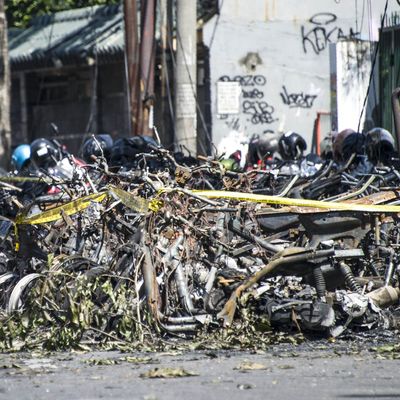
ISIS may have lost most of its territory in Syria and Iraq, but it still has the capability to carry out, or at least influence, operations well beyond the Middle East, as was made starkly apparent once again this weekend.
First, a knifeman shouting “Allahu akbar” attacked random pedestrians in Paris on Saturday, killing one person and injuring four before being shot dead by police. The attacker, Chechen immigrant Khamzat Azimov, recorded a cell-phone video pledging allegiance to ISIS, which the group released the day after his death.
A far deadlier and more complex operation took place in Indonesia on Sunday, where suicide bombers detonated explosives at three churches around Surabaya, the country’s second-largest city. The attacks, clearly targeting the city’s considerable Christian minority, killed seven people — not including the attackers — and injured 41.
In an unusual twist, police said that the bombers were a family of six: Dita Oepriarto, his wife, Puji Kuswati, and their four children. According to police, two sons aged 16 and 18 drove motorcycles strapped with bombs into a church on Sunday morning and detonated their payload. Dita Oepriarto then dropped his wife and 9- and 12-year-old daughters off at a second church, where they blew themselves up. Oepriarto drove his explosives-stocked minivan onto the grounds of a third church, where he set off the final explosion.
The parents were thought to belong to Jamaah Ansharut Daulah, an Indonesian terrorist group whose leader pledged allegiance to ISIS in 2014.
ISIS claimed responsibility for the Sunday blasts in a statement, though though specific links between the group and the bombers have not been made clear.
Indonesia launched a fierce effort to crack down on terrorism after the 2002 Bali attack, the worst in the country’s history, and it achieved some measure of success — with notable exceptions. But hundreds of Indonesians joined ISIS as the group swept across Iraq and Syria, and the terrorist group began targeting the world’s most populous Muslim-majority country in 2016. Sunday’s church bombings were the deadliest Indonesian attack associated with the group so far.
As the New York Times notes, Sunday’s attack came days before the holy month of Ramadan, when ISIS has ramped up its attacks over the last three years. “Analysts argue that if the group is able to carry out significant attacks, as it did during Ramadan over the previous three years, it would indicate that the group remained a potent threat, despite its territorial losses,” the paper reports.
An earlier version of this story incorrectly stated that Jamaah Ansharut Daulah carried out the 2002 Bali bombings.






























